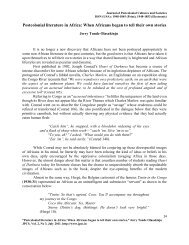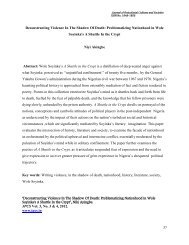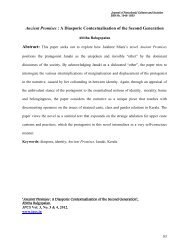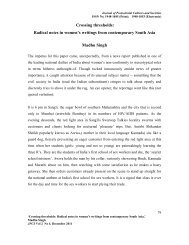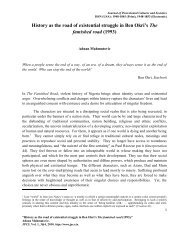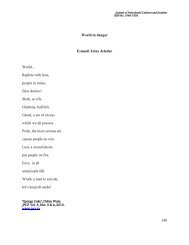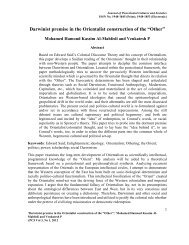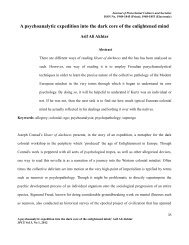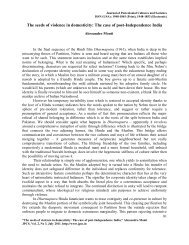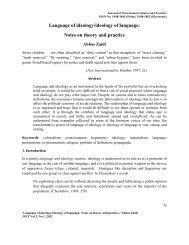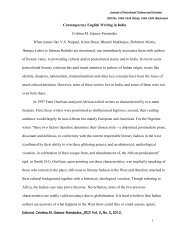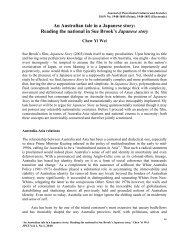The Long Forgetting: Post-colonial literary culture in New ... - JPCS
The Long Forgetting: Post-colonial literary culture in New ... - JPCS
The Long Forgetting: Post-colonial literary culture in New ... - JPCS
You also want an ePaper? Increase the reach of your titles
YUMPU automatically turns print PDFs into web optimized ePapers that Google loves.
Journal of <strong>Post</strong>-Colonial Cultures and Societies<br />
<strong>The</strong> <strong>Long</strong> <strong>Forgett<strong>in</strong>g</strong>: <strong>Post</strong>-<strong>colonial</strong> <strong>literary</strong> <strong>culture</strong> <strong>in</strong> <strong>New</strong> Zealand, by Patrick Evans,<br />
Christchurch, Canterbury University Press, 2007.<br />
Patrick Evans’s <strong>The</strong> <strong>Long</strong> <strong>Forgett<strong>in</strong>g</strong> is a bold and ambitious study of <strong>New</strong> Zealand <strong>literary</strong> <strong>culture</strong>,<br />
engag<strong>in</strong>g with various branches of antipodean and <strong>in</strong>ternational post<strong>colonial</strong> theory and offer<strong>in</strong>g a<br />
wide-rang<strong>in</strong>g overview of local <strong>literary</strong> and cultural developments from the late n<strong>in</strong>eteenth century to<br />
the first decade of the twenty-first. In particular, the book makes an important contribution to the field<br />
of ‘settlement studies’ – the analysis of white settler societies and literatures – that has flourished<br />
with<strong>in</strong> the antipodes over the last decade or so. Evans’s thesis is that literature produced by Pakeha<br />
(ethnic European) <strong>New</strong> Zealand settlers and their descendants has enacted a process of cultural<br />
‘forgett<strong>in</strong>g’ that occludes the material realities of the British colonisation of <strong>New</strong> Zealand, <strong>in</strong> particular<br />
the brutalities enacted upon <strong>in</strong>digenous Maori and the landscape. He argues that the ‘recolonisation’ of<br />
<strong>New</strong> Zealand – which followed the <strong>colonial</strong> wars (1843-1872) that resulted from disputes over the<br />
terms and consequences of the 1840 Treaty of Waitangi - was accompanied by a rhetoric of the sublime<br />
that masked the ‘gobbl<strong>in</strong>g up of the land’, marg<strong>in</strong>alised Maori, and fed <strong>in</strong>to a tourist <strong>in</strong>dustry that has<br />
marketed <strong>New</strong> Zealand as a ‘clean, green’ scenic wonderland, from the late n<strong>in</strong>eteenth-century ‘grand<br />
tour’ era to more recent manifestations such as Peter Jackson’s Lord of the R<strong>in</strong>gs film trilogy. Evans<br />
also argues that where Maori have been <strong>in</strong>corporated <strong>in</strong>to <strong>New</strong> Zealand’s myths of nationhood, it has<br />
been <strong>in</strong> terms of a ‘Pakeha-style’ biculturalism <strong>in</strong> which Pakeha have symbolically ‘<strong>in</strong>digenised’<br />
themselves (thereby transcend<strong>in</strong>g <strong>colonial</strong> guilt and responsibility) and Maori have been co-opted <strong>in</strong>to<br />
a romantic discourse of ‘Maoritanga’ largely based on Pakeha written sources. This is an extension of a<br />
contentious debate on the discursive ‘construction’ of Maori cultural identity (particularly centr<strong>in</strong>g on<br />
‘spirituality’) begun <strong>in</strong> the late 1980s by, <strong>in</strong>ter alia, <strong>literary</strong> critic Ruth Brown and anthropologist Allan<br />
Hanson (not ‘Robert’ Hanson as he appears on p. 94), and Evans will no doubt ruffle some feathers<br />
with<strong>in</strong> the Maori <strong>literary</strong> community with his assertions that many <strong>in</strong>digenous writers (s<strong>in</strong>ce the Maori<br />
<strong>literary</strong> renaissance of the 1970s) have been unable to transcend this dom<strong>in</strong>ant discourse. Evans’s<br />
avowedly neo-Marxist approach to <strong>New</strong> Zealand literature is well-justified <strong>in</strong> the ma<strong>in</strong>, but <strong>in</strong> the<br />
discussion of Maori literature, and <strong>in</strong> his assertions that contemporary Pakeha <strong>New</strong> Zealand writers<br />
have sacrificed an attention to local material realities <strong>in</strong> order to court overseas success (here draw<strong>in</strong>g<br />
upon Graham Huggan’s notion of the post<strong>colonial</strong> exotic) he can appear rather prescriptive and<br />
moralis<strong>in</strong>g at times.<br />
Evans argues that <strong>The</strong> <strong>Long</strong> <strong>Forgett<strong>in</strong>g</strong> ‘updates’ his earlier study <strong>The</strong> Pengu<strong>in</strong> History of <strong>New</strong><br />
Zealand Literature (1990), and like the former work it makes extensive use of subhead<strong>in</strong>gs and blends<br />
<strong>literary</strong> analysis with cultural/social history. In this case, however, the balance didn’t always feel right:<br />
lengthy contextual sections (focus<strong>in</strong>g, for example, on the history of whal<strong>in</strong>g, seal<strong>in</strong>g, and the meat<br />
trade) could have been pruned back to allow a more detailed analysis of the impressive range of<br />
primary texts mentioned <strong>in</strong> the book (<strong>in</strong> some cases, these appear merely as lists of titles with their<br />
relevance not always clear). <strong>The</strong> <strong>in</strong>troductory chapter <strong>in</strong> particular was structurally disorient<strong>in</strong>g, with<br />
some dizzy<strong>in</strong>g temporal and thematic leaps and spirals, though later chapters (which follow a broadly<br />
chronological trajectory) became easier to follow. More careful copy edit<strong>in</strong>g was also needed, as there<br />
are a sizeable number of misspell<strong>in</strong>gs of authors’ names and Maori/Pacific words.<br />
Book Review: Michelle Keown.<br />
<strong>JPCS</strong> Vol. 1 No. 1 2010. http://www.jpcs.<strong>in</strong> 103
Journal of <strong>Post</strong>-Colonial Cultures and Societies<br />
That said, as someone <strong>in</strong>tensely <strong>in</strong>terested <strong>in</strong> settlement studies (as well as <strong>New</strong> Zealand<br />
literature more generally), I found this book extremely helpful <strong>in</strong> reveal<strong>in</strong>g the astonish<strong>in</strong>g range of<br />
<strong>literary</strong> and theoretical production <strong>in</strong> this area. While I did not always agree with Evans’s arguments, I<br />
admire his encyclopaedic knowledge of <strong>New</strong> Zealand literature and <strong>literary</strong> <strong>culture</strong>, and found <strong>The</strong><br />
<strong>Long</strong> <strong>Forgett<strong>in</strong>g</strong> a provocative and often audacious work that will no doubt give rise to some<br />
stimulat<strong>in</strong>g future debates with<strong>in</strong> <strong>New</strong> Zealand <strong>literary</strong>-critical circles.<br />
_________________________<br />
Michelle Keown is Senior Lecturer <strong>in</strong> English Literature at the University of Ed<strong>in</strong>burgh. She has<br />
published widely on Maori and Pacific writ<strong>in</strong>g and is the author of <strong>Post</strong><strong>colonial</strong> Pacific Writ<strong>in</strong>g:<br />
Representations of the Body (Routledge, 2005) and Pacific Islands Writ<strong>in</strong>g: <strong>The</strong> <strong>Post</strong><strong>colonial</strong><br />
Literatures of Aotearoa/<strong>New</strong> Zealand and Oceania (Oxford University Press, 2007).<br />
Book Review: Michelle Keown.<br />
<strong>JPCS</strong> Vol. 1 No. 1 2010. http://www.jpcs.<strong>in</strong> 104



